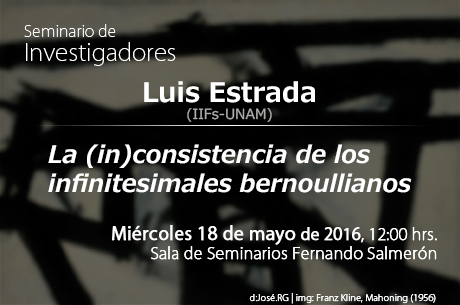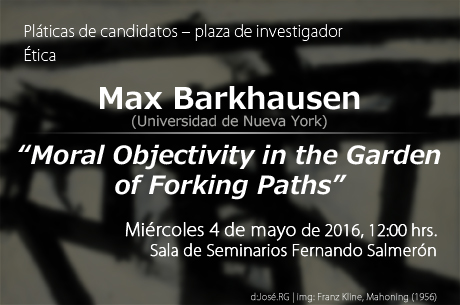investigadores-mayo-2016
Sala de Seminarios Fernando Salmerón, IIFs
Miércoles de 12:00 a 14:00 horas
Miércoles 18 de Mayo 2016
Luis Estrada, IIFs-UNAM
_____________________
“La (in)consistencia de los infinitesimales bernoullianos”
Miércoles 4 de Mayo 2016
Pláticas de los finalistas de una plaza de investigador en el área de ética o en el área de epistemología:
Ética
___________________________
Max Barkhausen (Universidad de Nueva York)
" Moral Objectivity in the Garden of Forking Paths "
In my talk, I am going to defend the thesis that morality is not objective and I will go on to argue, by elimination of competing anti-objectivist views, that a form of speaker-relativism is the most promising non-error-theoretic, anti-objectivist meta-ethical view. My argument against moral objectivity is a version of what has become known as the reliability challenge in the philosophy of mathematics and, more recently, in meta-ethics. This challenge is to explain why our beliefs, in a given domain, are by and large true. I will argue that objectivist meta-ethical theories are in principle incapable of explaining the correlation between our moral beliefs and the moral facts because they are committed that it obtains in virtue of a lucky coincidence. According to proponents of a well-known extant debunking argument, this is because our evolution more or less deterministically explains our moral beliefs and so, if the moral facts were different, our beliefs would be false. I am going to show that this extant argument is highly problematic even if we grant the premise and the force of the reliability challenge. Then, I will argue that objectivists cannot explain why we are reliable because the opposite is true of our fundamental moral beliefs: they are highly contingent and, assuming objectivity, they could have easily veered off the moral truths.
Miércoles 11 de Mayo 2016

Zenia Yébenes (UAM-Cuajimalpa)
"Estados alterados: en torno a la imaginación política a partir de Kant y de Foucault"
Introducción
Este ensayo constituye una reflexión no sobre dos casos, sino en el horizonte de dos casos, que han provocado que aparecieran ciertas preguntas. El primero es el de John Brown, abolicionista del siglo XIX, que fue ahorcado en 1859 por liderar un levantamiento en Harpers Ferry, Virginia. Él y dieciocho seguidores (algunos blancos, algunos afroamericanos) intentaron tomar el control de un arsenal federal con la esperanza de establecer una zona libre de esclavos en el Sur. Los esclavistas leyeron el levantamiento como evidencia de una conspiración abolicionista, pero los partidarios del Norte (Incluyendo miembros de la familia de Brown) le solicitaron un indulto...
Aviso de privacidad


 Leer documento
Leer documento


 Circuito Maestro Mario de la Cueva s/n, Ciudad Universitaria, C.P. 04510, Coyoacán México, CDMX
Circuito Maestro Mario de la Cueva s/n, Ciudad Universitaria, C.P. 04510, Coyoacán México, CDMX